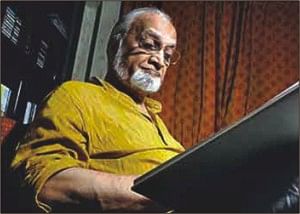Farewell to Vijay Tendulkar

Vijay Tendulkar
The death of iconic Marathi playwright Vijay Tendulkar in Pune on May 19 brought down the curtains on a golden era of Indian theatre. Tendulkar, 80, who had been ailing for quite some time, is considered one of the doyens of modern Indian playwrights, along with Badal Sircar, Mohan Rakesh and Girish Karnad, who experimented with style and content of drama in a bold and unconventional manner that at times shocked the audience.
Tendulkar, like all great authors, was quite ahead of his time as he drew on real-life stories of social exploitation of men and women under a feudal-capitalistic set-up to pen his over 35 plays, short stories and two novels. Known for his pro-Left leanings, he rose to become an iconic figure for theatre lovers through the 1960s, 1970s and 1980s by his rebellious and iconoclastic style that earned as much bouquets as controversies. Some of the best known plays of Tendulkar are Shantaa, court chalu ahe (Silence, the court is on, 1967), Sakharam Binder (Sakharam the book binder, 1972), Ghasiram Kotwal (1972) and Kamala (1981)--all of them critically acclaimed by viewers across India.
Although Tendulkar wrote plays in his mother tongue Marathi, his plays were translated into several other Indian languages and became highly popular beyond Maharashtra also. In Kolkata, the Bengali translation Choop, Adalata Cholchey of Tendulkar's play was very popular and ran to full houses for several years.
A firm believer in secularism, Tendulkar never hesitated to cross swords with radical outfits who did not like his treatment of political violence and sex in society. If Sakharam Binder is a story of male domination over women, Ghasiram Kotwal tells the story of the lust for political power leading to moral downfall. Born in a middle class family, he was merciless on the follies of the class in the pursuit of upward mobility in terms of money and power.
Like all avant garde artistes, Tendulkar refused to tread the beaten path of indulging in melodrama and explored new subjects and new method of telling a story. His ruthless exposure of political violence and social and sexual exploitations made him an uncompromisingly anti-establishment figure all through his five decades as a playwright. For this reason, many variously described Tendulkar a Marxist, a Leftist and pro-Naxal.
Besides the stage, Tendulkar left an indelible mark on the parallel Indian cinema as he wrote the scripts of some films by eminent directors like Shyam Benegal and Govind Nihalani. The playwright wrote the script of Benegal's movie Nishant which is a story about the powerful feudals and sexual exploitation of women. The film had earned the national award for best feature film in1975. He also penned the script of another Benegal film Manthan, a story about the cooperative milk movement in Gujarat against the backdrop of a feudal set-up, which brought Tendulkar the national award for best screenplay.
The best example of Tendulkar's refusal to compromise on his convictions and political outlook came in the script he prepared for Nihalani's film Akrosh (1980), a powerful story of exploitation of the lowest strata of society by rural elite against the backdrop of naxalite movement. Starring Om Puri, Smita Patil, Naseeruddin Shah and Amrish Puri, Akrosh is one of the finest political movies and the best by Nihalani.
Tendulkar also worked with Nihalani for the latter's films Ardh Satya (1983), also starring Om Puri and Smita Patil, which is the story of the politician-police-underworld nexus in Mumbai and Aaghat (again featuring Om Puri) which exposes the dishonesty and hypocrisy of trade union leaders.
Akrosh and Ardh Satya earned Tendulkar the Filmfare awards for best stories.
There were no dearth of awards coming Tendulkar's way, including Kalamadevi Chattopadhyaya award, Saraswati Samman, Sangeet Natak Academi fellowship and Padma Bhusan, the Indian government award for civilians.
The last few years of Tendulkar's life were beset with illnesses and personal tragedies as he lost his wife, daughter Priya Tendulkar, who became a household name through television serial Rajni, exposing corruption in society, and son.

 For all latest news, follow The Daily Star's Google News channel.
For all latest news, follow The Daily Star's Google News channel. 



Comments